There’s no one size fits all solution for coping with grief for widows. There is, however, one thing that is so versatile it will likely be something nearly every widow can benefit from. I’m talking about music. The right music has the power to transform our mood, soothe our anxiety, and boost our energy. Listening to the right lyrics can give us a way to express our emotions, release tension, and reengage with the world around us.
Music can heal the wounds which medicine cannot touch.
– Debasish Mridha
I love the insight of this quote. Our grief is one of those wounds in our soul others can’t see. When you can’t see it, it can be hard for people to realize or recognize the level of pain we may be feeling. There is very little we can do to care for this wound physically. Grief is a heart and mental wound that can manifest in physical symptoms and emotional reactions.
Music transcends obstacles. It can weave its way so gently to our most vulnerable places to bring soothing comfort or guide us to a safer place where we can catch our breath and get on a more stable footing. Music is one of the most important tools I use to help me on this journey as I seek to find real healing.
To the honor of the Most High alone,
and for my neighbor, to be enlightened from it….
– Inscription from Orgelbüchlein by J. S. Bach, Weimar, c. 17141
One of history’s greatest musicians was Johann Sebastian Bach. His work was fueled by his faith as much as by talent. He composed some of the most beautiful music the world has ever known. I recently learned his life was one of hardship and constant devastating loss.
Johann was born into a family of musicians where he learned to sing and play several instruments at an early age. Before he was even ten years old, both of his parents died. His legacy of innovative choral pieces began when he was only 17. He married his cousin Maria Barbara Bach when he was 21. The couple had seven children together, but one of his daughters and three of his sons died. They were only married 13 years before Maria also died, leaving him a widower at a young age. A year or so later, Bach married a singer named Anna Magdalena Wulcken. They had thirteen children together, and four more daughters and three sons died as children.
It’s very hard to imagine how a man could possibly deal with this much grief and loss. He turned to his faith and gave God the glory.
He put “Lord help” in the beginning of his music, and ended each piece with “Soli Deo gloria,” which means Glory to God alone. Bach’s music itself is prayer. This means we can think of his music as a conversation between man and God.
How do you deal with pain? I can’t even fathom the depth of sorrow Bach must have known. He found strength and a purpose that lives on even today by choosing to worship our Creator God. He embraced the healing power of music to both express his heart and soul cries, and to find solace. He shared his God-given gift with the world to help others who may be suffering find peace only God can give.
Bach’s gift to us was so much more than the beautiful music. His music is filled with joy that saturates the atmosphere when it is released. Even after more than 250 years, his music still lifts the heart and energizes the soul. Bach wrote explicitly biblical music for God. God now uses these powerful melodies to console other hurting hearts, restore hope and faith, and inspire devotion to God.
Music replays the past memories, awakens our forgotten worlds and make our minds travel.
– Michael Bassey Johnson
Music can combine with words and heighten their emotional impact in a way we may not perceive with spoken words and reading words on a page. This can have several advantages. Singing can help us take more time to reflect on the meaning of words. It can stretch out words and phrases. It can allow us to repeat them or put space in between words. All these qualities can help us engage emotionally with the words we’re singing.
This is why hearing certain songs can trigger memories we hold dear and bring us back in time. Our mind travels to those places we love, people we miss like our dear husband, and adventures we took doing things we may no longer be able to do. Music ignites passion and stirs emotions as we are transported on waves of sound that resonate in the depths of our being.
Music is one of the longest standing self prescribed therapy in history.
– Erin Seibert, Music therapist
Music is accessible to people of every age. There is so much variety in music it can cater to any mood and every taste. This helps make it a vital tool in therapy. It is used in grief therapy and hospice care. It can help treat physical, psychological, cognitive, and social needs. Seniors with mental challenges can benefit as much as children with symptoms of autism. We don’t even need a professional to prescribe it. Access is available on diverse media sources from television and radio to smart phones and computers.
The biggest challenge here is choosing the right music. Its power to heal can be just as effective to pull us down in the dumps. If we choose lovesick country music songs of sad and heartbroken people, those lyrics can send us to the depths of despair. We need to be very mindful of the songs we choose. Even if we think it would help to express our sorrow through the wailing of a song, it is probably not good idea unless we have a counter measure to switch to when we’re done so we can end with something positive to redirect us.
Life seems to go on without effort when I am filled with music.
– George Eliot
Music can help us mange our grief and loss in multiple ways. After our husband went to Heaven we grieve inside. We are processing painful thoughts and feelings. Mourning allows us to express this grief outside ourselves. Mourning is an essential step toward healing. Mourning is crying, talking to other people about our husband, sharing stories, journaling, and using music to meet the six needs of mourning one day at a time. The six needs of mourning include acknowledging the reality of the death, embracing the pain of the loss, remembering the person who died, developing a new self-identity, searching for meaning, and receiving ongoing support from others.
Acknowledging the Reality of the Death
Acknowledging the reality of the death is probably one of the hardest parts in the beginning when someone we love dies, especially when we are talking about our husband—the man who was our soul mate and the other half of everything we did. It is a truth we may not be ready to accept without working through some tough heartache. Music allows us to manage this grief by listening to songs that remind us of him and our life we shared. It is a process for sure. The songs and types of songs we might use will probably evolve as we continue to accept the reality and eventually learn to live with it. Some of the music will stimulate a painful response and some will help us remember a love we can’t replace. Songs can help us remember the person by stimulating stories about him and our life together. Telling these stories keeps his memory alive.
Embracing the Pain of the Loss
Embracing the pain of the loss is incredibly hard. We are conditioned to avoid pain. Healing and moving forward requires us to be able to sit with pain. Listening to music that captures how we feel can help us achieve this. It doesn’t need to be tied directly to our husband. Listening to sad or angry music to connect us with those feelings gives us a chance to express it in a safe way. Just be mindful to do this within a boundary so it doesn’t cause harm. When you have a happy memory of your husband, it’s just as important to try putting on music that makes you feel good and keeps that feeling alive.
Remembering the Person who Died
Remembering our husband can include sharing stories through music. Perhaps you can make a playlist for your husband. It can include songs that remind you of him or ones you remember sharing with him that made your relationship special. There might be special love songs you enjoyed on Valentines Day or your anniversary. Christmas songs may be part of your Holiday that were traditions you shared. Hymns or songs on the radio or at church may be part of your legacy with him.
I realize this part can really take time. Take it as you can on the journey. Some songs may need to wait until you are healed somewhat to be able to add them to the playlist. The grief process is very individual so it’s alright to adapt each step and even revisit and change parts as you keep moving forward on this journey. It’s incredibly important to reminisce and share. It helps us accept reality. When we remember the past, we make it possible to hope for a future.
Developing a New Self-Identity
The next need of mourning is developing a new self-identity. Allowing ourselves to experience the pain of the loss makes it possible to start to move forward. Many people who experienced grief and loss find a new sense of identity. I believe this is even more pronounced for widows. Our identity was so entwined with our husband as his wife we usually have a very difficult time with this. Instead of being a couple we are now single – sometimes for the first time in our adult life. We made decisions, plans and nearly everything in coordination and cooperation with our spouse. Now we are suddenly alone, and our entire thinking process needs adjustment. Music can help us explore new ways to use our voice. Maybe we can explore new types of music to enjoy, learn to play a new instrument, or just express ourselves in louder or quieter volume as we explore who we want to be moving forward. The versatility of music can help us explore and symbolize a new role in our life.
Searching for Meaning
This leads us to searching for meaning. Making sense of this loss is difficult whether it is painfully slow in coming by dealing with a terminal illness over time or when it happens suddenly or instantly due to some type of accident or incident. It’s hard to make sense when bad things happen that so disrupt the trajectory of your life. The grief is real and valid. We are wired to want and need answers that make sense. We want to understand so we can heal.
Music can be used to find greater meaning and purpose in grief and loss. Sacred services and musical experiences help us transcend our everyday realities. Music can be a spiritual experience, which doesn’t necessarily mean religious. Spiritual experiences bring healing to people dealing with grief and loss. God created music. Music helps tap into a deeper sense of connection and purpose. God’s heart for setting words to melodies is evident from even a casual reading of the Psalms. The Bible contains over four hundred references to singing and fifty direct commands to sing. Singing is a way to express our thanks and praise to God. It allows us to pour out our hearts. It brings comfort and solace. It helps us learn and remember God’s Word and connects the words we sing with our hearts. Music is powerful in so many ways.
Receiving Ongoing Support from Others
The final need of mourning is receiving ongoing support from others. This involves surrounding ourselves with a support system. I can’t stress enough how important this is. We need at least a couple people we can trust to share memories, cry with, and who are willing and able to listen when we need to express what is on our heart.
It’s very important after we lost a loved one to lean on people in ways that feel most comfortable to you. This can be through engaging with family, joining peer support groups, and perhaps even finding a music therapist experienced in working with grief and loss. Whatever you choose, it’s your grief journey. Some people will be able to grow and heal with just a few people in their support network and others will need many people to come alongside them.
This is also a process that can change along the way. Some will need more people in their corner at the start and be able to do just fine as time moves forward. Some may be in such shock and pain in the beginning it feels impossible to connect with even close people for help. Then as reality sets in and they begin to want to connect with support systems they may need it for a more extended time frame. There’s no right or wrong way. It must fit the needs of each individual.
Music acts like a magic key, to which the most tightly closed heart opens.
– Maria von Trapp
Music affects all of us deeply for several reasons. No matter what, it is good music is so versatile and universal it can be a tool nearly everyone can use to help us through the difficult seasons this life brings. Our hurts and the lessons we learn as we navigate the many phases and chapters of this life will prayerfully one day be times we look back on to see where we were strengthened and we can count as blessings. Music brings healing. God designed our ears and our brains so we would be able to create and enjoy music. God created music to benefit our minds, bodies and social interactions, bringing positive effects on our physical and mental health. May music be something you can use to comfort, arm, and shield yourself on your journey.
Like Bach’s beautiful musical creations, there is a lot of sacred and uplifting music available for us to listen to and sing with today. It may be created on earth, but it invites us to experience a bit of heaven right where we are. God bless you.
Music is God’s gift to man, the only art of Heaven given to earth, the only art of earth we take to Heaven.
~Walter Savage Landor


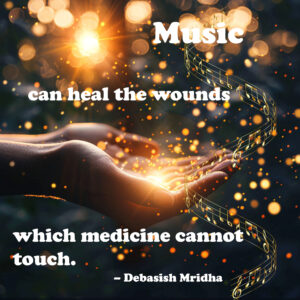
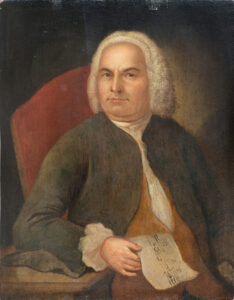

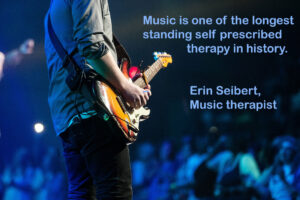
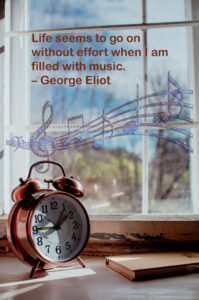
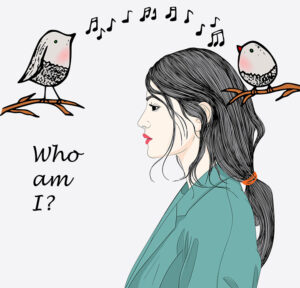
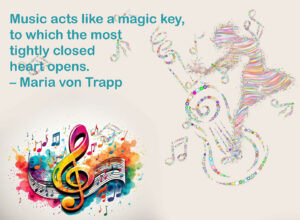
Beautifully written. My husband had cancer and was bedridden. Our cable provider has a beautiful instrumental station and this channel was on day and night. My husband was cremated and he is back in our bedroom (not me yet) and I have the music channel playing day and night for him. When I come into our bedroom to talk to him, sometimes a very meaningful song is being played and I’d like to think he had selected it just for me. Music is very soothing and I hope his spirit approves. Thank you for your blog.
Thank you, Kathy, for sharing how music is helping you on your journey. I believe God is probably behind getting those meaningful songs for you when you need them. He knows what we need and when we need it. I also believe our husbands are aware of some of the things we are doing here on earth. I’m sure your husband approves because he would want you to heal and be as happy as possible as you make the most of the life you have here. God bless you.